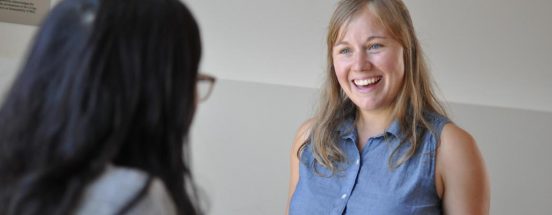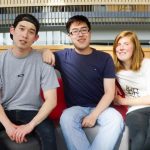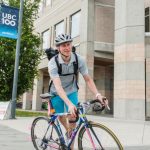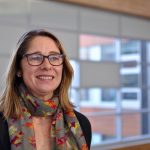This spotlight is part of a series to profile “Inhabitants” who work, research and study in the Centre for Interactive Research on Sustainability (CIRS) as a way to reinforce connections within the CIRS and broader community.
This week, we talk to Kristy McConnel, a SEEDS Sustainability Coordinator and a graduate student in the School of Community and Regional Planning.
Tell us a bit about yourself!
I am currently a second year master’s student at the School of Community and Regional Planning, where I am focusing my research on sustainable food systems, particularly looking at the role of small-scale agriculture (for example community, or patio gardens) in social and environmental sustainability. I am also a Project Coordinator for the SEEDS Sustainability Program at Campus and Community Planning, where I work to engage students, faculty, and staff to work collaboratively to tackle sustainability challenges on campus.
What’s your favourite thing about sustainability at UBC?
My favourite thing about Sustainability at UBC is summed up in this quote – “At UBC, sustainability is not just a word to define – it’s a word that defines us.” Everywhere you look, you will find members of the UBC community working to improve campus sustainability – from finding creative ways to reduce our environmental footprint, to building social sustainability through public art, such as the recently installed Strata Sphere. I love that sustainability at UBC is not an afterthought, but a fundamental part of the community’s identity.
What has been your favourite project to work on while at UBC?
I have been fortunate to work on a lot of amazing projects at UBC, but right now, I am really excited about a SEEDS project I am coordinating, where we will be engaging students to revamp the Arts Ticket Trike, which aims to brings the arts to students across campus. Stay tuned for more on this in September…
Why did you apply to be the SEEDS project coordinator?
My interest in the SEEDS project coordinator role was two-fold. First, I was looking for work in line with my values that would inspire me, and allow me to engage with the issues I care about every day. Second, when I completed my undergraduate degree at UBC, I struggled to find meaningful, applied research opportunities. As a SEEDS project coordinator, I have the opportunity to help connect students to the opportunities I craved, which is incredibly rewarding.
What does “community” mean to you?
To me, community is all about the notion that the sum of the parts is greater than the whole. A community is the collective support network that allows for individuals to thrive.
How do you overcome the challenge of such a huge campus when trying to build community and connect people?
I think the most important thing in building community, and connecting people, is to find a common goal. When you can help people realize they are working towards a common outcome, and that everyone can contribute something to get there, people are more motivated to work together.
How does your work impact people on campus?
My work allows students the opportunity to work on real-world sustainability problems, while helping UBC to realize its sustainability targets. In turn, I think that everyone on campus benefits from a healthier, happier campus.
Do you have someone that you see as a role model or mentor for sustainability in your life?
At CIRS, I am so lucky to be surrounded by role models in my colleagues who make sustainable decisions every day, like commuting by bus and bike, growing their own food, and taking responsibility for their consumption and waste. That said, if I had to pick one person who has greatly influenced my views on sustainability, I would have to say David Attenborough, who taught me to always find wonder and awe in the natural world.
What’s your favourite thing to do when you’re not busy championing sustainability?
When I’m not championing sustainability, I love being outside, and my favourite activity is running. I always try to have at least one race in my calendar to keep myself motivated – next up is the Vancouver Eastside 10 k.





